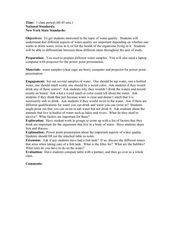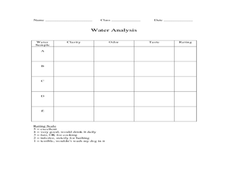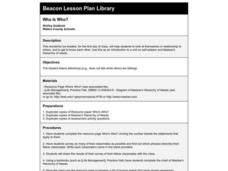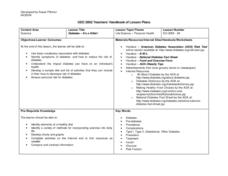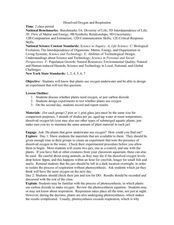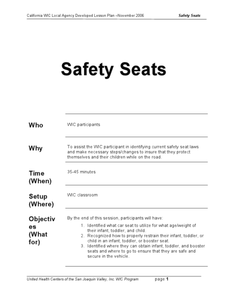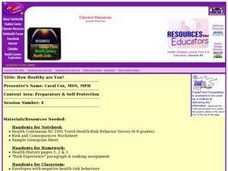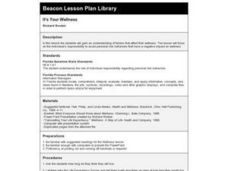Curated OER
Water Quality with Samples
Students recognize whether one wants to drink water, swim in it, or for the health of the organisms living in it. They prepare different water samples to observe and collect samples regarding the water quality.
Curated OER
Is Our Water Healthy?
High schoolers test water for a least one chemical characteristic. They hypothesize how a storm event might change the chemical characteristics of a stream. Students collect water samples and use the chemical test to test the water.
Curated OER
Bottled Water vs. Tap Water
Learners analyze the similarities and differences between tap water and bottled water. They make informed decisions about their use of each. Students are asked if they drink mostly tap water straight from the tap or water fountain. They...
Curated OER
Who Is Who?
First graders complete the resource page Who's Who? then survey their classmates to see which phrases describe their classmates.
Curated OER
Diabetes - It's a Killer!
Learners survey, graph and chart their prior knowledge about diabetes. They read a handout and complete a K-W-L chart. They develop a rubric to assess their diet and exercise and develop a shopping list, menu and exercise plan to share.
Curated OER
Does Mother Nature Know Best?
Investigate herbal medicine in the science or health classroom with this lesson from the New York Times. After a discussion about class members beliefs about and experiences with herbal medicines, pupils read an article that might impact...
Curated OER
Who is the Expert? Exploring Credible Sources in Healthcare
How do you decide what sources are credible when researching online? Evaluate sources with a focus on researching health issues. After brainstorming common health concerns and how they would try to diagnose these problems, class members...
PBS
Technology: Conveniences and Consequences
It's a delicate balance—using technology to improve our lives while still protecting the environment, and ourselves, from the hazards of technology use. Class members examine statistics about the increase in media use, complete a survey...
Curated OER
Parents And Alcohol: Who's To Blame
Students explore the topic of underage drinking. They find a focus and write a news feature/analysis that reports on what the community is doing to prevent underage drinking and some assessment of the extent of the problem.
Curated OER
Nutrition Lesson Plan
Second graders complete a survey as class answering the question: "Did you eat breakfast this morning?". They place a tally mark in the column that best represents their answer. They then discuss the results in the graph.
Odyssey of the Mind
Odyssey of the Mind Curriculum Activity: HEALTHY HUMOR
This lesson is hilarious! To understand how to investigate a topic, collect data, and evaluate the results, learners research the effects of laughter on health. Each group is assigned a research task, which they will turn into...
Baylor College
How Do We Use Water?
Send youngsters home to survey how they use water in their homes. Then bring them together to discuss which uses are essential for our health and which are not. A helpful video offers teaching tips for this lesson plan, and a...
Curated OER
Fifty States Field Day
Students explore the 50 states in preparation for a special field day. On the actual field day, the oldest students in the school manage each of 50 physical activity stations. They share information about each state and introduce the...
Curated OER
Tides in the Hudson
Students view an illustration of the Hudson River watershed and identify the bodies of water shown. They discuss what happens when fresh and salt water mix. Students view a teacher demonstration of the stratification of fresh and salt...
Curated OER
Dissolved Oxygen and Respiration
Students are presented with the question, "Do plants that grow underwater use oxygen?" They create an experiment to test the presence of dissolved oxygen in the water using provided materials. Student experiments include a control jar as...
Curated OER
Change Since 1609
Students recognize how the climate of the Hudson Valley has changed since the last glaciation. They explain these changes using a reconstruction of the land use changes in the Hudson Valley composed of confetti, Ziploc bags and other...
Curated OER
Paleoclimate of the Hudson Valley
Students recognize how the climate of the Hudson Valley has changed since the last glaciation and be able to explain these changes. They reconstruct the paleoclimate of the Hudson Valley.
Curated OER
Polymers and Products from Petroleum
Over four sessions, learners survey the production and use of polymers and petroleum products. First, they participate in a kinesthetic activity to demonstrate how polymers act, and review a list of common products made from polymers....
Curated OER
I Wash My Hands of It!
Students conduct a survey about hand washing. They view the results and examine "Infection Charts". They research diseases and talk about the importance of handwashing and how they could improve their hand washing habits.
Curated OER
Safety Seats
Students identify the different types of car seats. In this adult health lesson, students describe the proper way of restraining a child in the car. They solve real life scenarios given in class.
Curated OER
How Healthy are You?
Students determine how healthy they are. They examine health risk behaviors of adolescents and their consequences. They complete a risk factor survey and discuss why they might take risks.
Curated OER
Uk Kids 'Could Have Happier Life'
Students evaluate a survey done to determine the level of happiness in United Kingdom students. They look at the most common reasons students report for being unhappy and compare these results to similar surveys done in different...
Curated OER
Those Convincing Commercials
Second graders study commercials and determine which cereal they feel is the most nutritious.
Curated OER
It's Your Wellness
Students define wellness and take a Life Expectancy Survey. They discuss factors that affect wellness, view a Powerpoint presentation on wellness, and design a mouse pad that demonstrates how to avoid negative personal risk behaviors.


